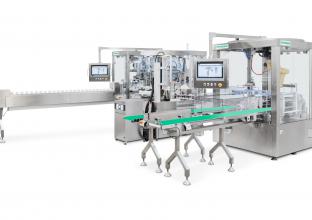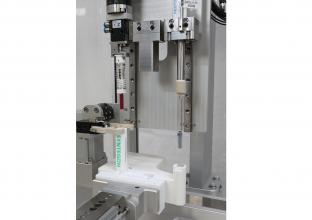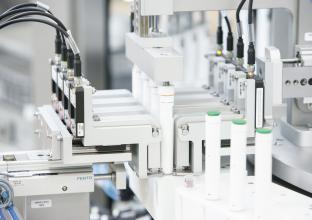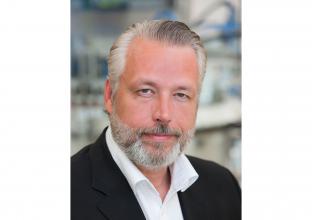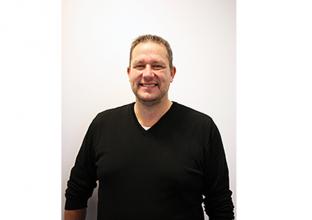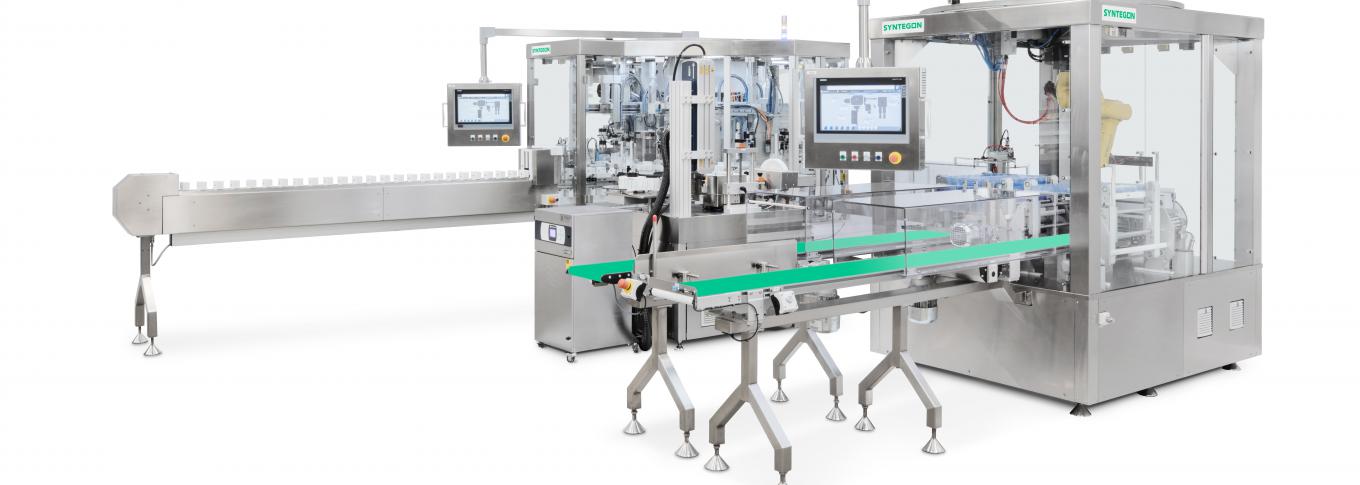
The fast way to a safe insulin pen
Diabetes is on the rise worldwide with around 10 million people being diagnosed with the disease every year. This pushes up the demand for insulin pens for self-injection. Syntegon's Danish subsidiary has developed an automated system for assembling these pens using the Festo automation platform.
"I have a dream," says Michael Andersen, Sales Director of Syntegon Technology Sandved in Denmark. "I have a dream of our machines doing on-the-fly format changes. That would be the culmination of our philosophy of flexibility and agility that we strive for in our company," adds the automation expert.
Flexibility and agility
"By using the Festo automation platform, which includes the servo press kit, we are already very close to making this dream come true," says Andersen. In fact, Festo's servo press kit YJKP – a preconfigured modular system consisting of software, controllers and standard electrical drives – can be easily integrated in the plant and offers a high degree of flexibility thanks to the preinstalled software. This means that the modular press system with servo drive for electric pressing and joining up to 17 kN is ready for immediate use and, compared to similar solutions on the market, is both intuitively to parameterize and cost-effective.
"We have installed more than a 100 servo press kits in the automated assembly lines for insulin pens," says Ulrik Keldke, Head of Syntegon's engineering department in Sandved. The precisely adjustable pressing and joining forces ensure consistent quality and low reject rates. "What we particularly like about the Festo servo press kit is that it’s quick and easy to commission, and the machine operators don’t need to be trained to use it," explains chief engineer Keldke.
Quality and safety
"Automating the assembly line is a prerequisite for meeting the requirements for the end product: the insulin pens must be safe and user-friendly," says Andersen. The pens must not break when used by the patients, as that would put them at risk. The Servo Press Kit keeps the tension and pressure constant. "The glass of the syringes should never be subjected to irregular pressure as they would break," Keldke says. The automated systems ensure that the insulin pens are always in order and can deliver the exact amount of insulin.
Depending on the machine type, Syntegon's assembly lines produce up to 300 pens per minute. The degree of automation is scalable according to requirements and can also be adapted at a later date. The machine concepts are based either on a rotary table for low to medium outputs or on a linear transport system for high outputs. The system can be expanded with automatic feeders and stations to increase output and the degree of automation.
Consistency and reliability
Syntegon Technology, formerly Bosch Packaging Technology, sees itself as a provider of integrated solutions. The assembly line for insulin pens can be expanded into a complete line with other systems from the company. Pharmaceutical manufacturers can thus be provided with machines for all process steps, from filling, capping, assembly, testing, to labelling and packaging – preconfigured and from a single source.
The machine control system is based on electrical and pneumatic components and modules from the Festo automation platform. This ensures a consistency of supply since Festo products are available worldwide and offer open interfaces to higher-level controllers. The CPX-E-CEC module from Festo establishes the connection to the process control level, allowing it to be used with Profinet or, for other customers in Europe, with EtherCat. Especially for North American customers, however, the system could also be supplied with an Ethernet/IP module.
Standardization of the components side has other benefits that prove to be a competitive advantage for Syntegon: a faster time-to-market. "This trend is becoming increasingly important in the pharmaceutical industry," explains Syntegon's Michael Andersen. "Currently, we are able to deliver systems after six to nine months. However, our goal is to reduce this to three to six months. With our approach focused on flexibility and agility, we are getting closer to this goal every day."
About Syntegon Technology
Syntegon Technology is a leading global provider of process and packaging technology. Formerly the packaging division of the Bosch Group, the company, headquartered in Waiblingen (Germany), has been offering complete solutions for the pharmaceutical and food industries for over 50 years. More than 6,100 employees at 30 locations in more than 15 countries generated a total revenue of 1.3 billion euros in 2019. The portfolio of intelligent and sustainable technologies includes stand-alone machines, as well as complete systems and services. Fields of application in the pharmaceutical industry are the production, processing, filling, inspection and packaging of liquid and solid pharmaceuticals (e.g. syringes and capsules). In the food industry, the portfolio includes process technology for confectionery as well as packaging solutions for dry foods (e.g. bars, bakery products and coffee), frozen foods and dairy products.
Festo is a global player and an independent family-owned company with headquarters in Esslingen am Neckar, Germany. Festo has set standards in industrial automation technology and technical education ever since its establishment, thereby making a contribution to sustainable development of the environment, the economy and society. The company supplies pneumatic and electrical automation technology to 300,000 customers of factory and process automation in over 35 industries. Digitalization, AI and the LifeTech sector with medical technology and laboratory automation are becoming increasingly important. The products and services are available in 176 countries. With about 20,600 employees in over 250 branch offices in around 60 countries worldwide, Festo achieved a turnover of around €3.45 billion in 2024. More than 8% of this turnover is invested in research and development. In this learning company, 1.5 % of turnover is invested in basic and further training. Festo Didactic SE is a leading provider of technical education and training and offers its customers worldwide comprehensive digital and physical learning solutions in the industrial environment.

